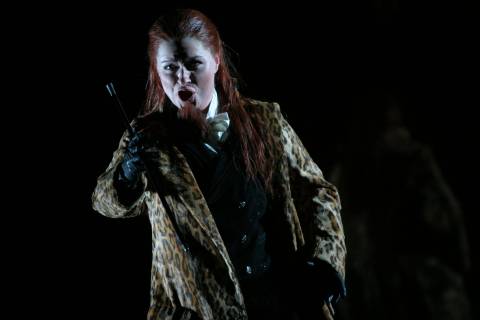|
<< -- 4 -- Robert Hugill GRIPPING STUFF

The necessities of plot mean that for most of Acts 2 and 3, Ginevra is in prison and is given a haunting series of tragic arias. Evans had seemed not quite at home in Act 1, with the top end of her quite powerful voice almost breaking the line of the music. But she was perfect in Acts 2 and 3, combining a dramatic voice with fine Handelian style to produce a series of moving arias. Despite the steady, lamenting nature of these pieces, Evans's musicianship and sense of drama was such that we felt for Ginevra and never tired of her state of accepting despair. A major lapse in Alden's dramatic sense would seem to be the moment when Ginevra is freed, towards the end of Act 3. Each character in turn apologises to her but Alden had the singers sing to her without freeing her from her chains; perhaps he wanted to suggest that characters' apologies were more about their own attitude than real care for Ginevra. But the result did look a little risible, I'm afraid.

Patricia Bardon as Polinesso in Handel's 'Ariodante'. Photo © 2006 English National Opera and Stephen Vaughan
|
As Polinesso, Patricia Bardon was wonderfully evil. Whereas Ariodante was written for a castrato, Polinesso was written for a woman to sing. Bardon's voice is lower and darker than Coote's, and so proved a fine contrast. Like Coote, Bardon is adept at producing an androgynous image for such roles. I did feel that Alden encouraged Bardon to be a little over the top in her emoting of evil during Act 2, at times this became dangerously close to comical. Bardon and Coote made a pretty convincing job of the duel in Act 3, which they had to fight with swords in full armour -- not an easy task.
Continue >>
Copyright © 5 June 2006
Robert Hugill, London UK

|

